Ted Butterman: Wrigley Field’s King of Swing
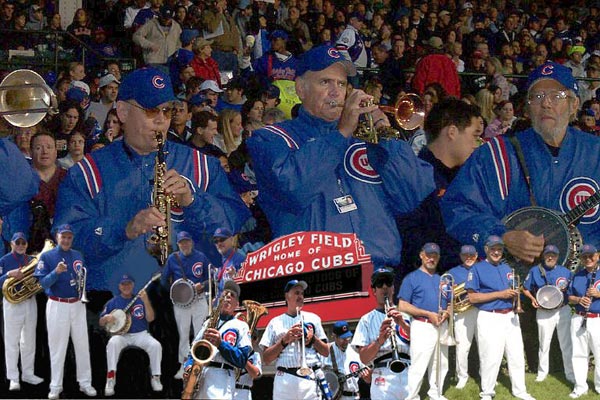
Ted Butterman, 1935-2022 (center)
The Chicago Cubs paid regal tribute to the passing of Queen Elizabeth II with a moment of silence before Friday’s game against the San Francisco Giants.
But they missed on Wrigley Field’s King of Swing.
Slugger Dave Kingman? Nope. Third baseman Patrick Wisdom? They’re still here.
Wrigley Field bandleader Ted Butterman died Aug. 31 in a care facility in Buffalo Grove, Il. The Dixieland jazz maestro was 87 years old. He was in hospice for one day. A lifelong musician, Mr. Butterman played to his biggest audiences between 1982 and 2017 at Wrigley Field.
Before the 1982 season, Mr. Butterman called the Cubs office with the idea of playing Dixieland music at games. He was a baseball fan. He wanted to model his act after “The Symphoney,” a nutty pseudo-Dixieland band that strolled the stands during Brooklyn Dodgers games at Ebbets Field in the 1940s. The Cubs had no entertainment in 1982 besides a live organ player. This was before rap and Clark the Cub.
Mr. Butterman’s Chicago Cub Quintet consisted of clarinet, banjo, trombone, and tuba. Mr. Butterman played coronet. They dressed in replica Cubs uniforms and wandered around the ballpark. Accomplished Chicago jazz musicians who played with Mr. Butterman at Wrigley included John Bany, Chuck Hedges, Eric Schneider, and Don Stiernberg.
Mr. Butterman and his group would often come and sit with us in the old Section 242 at Wrigley. I teased him about smoking funny cigarettes and we always tried to stump him with a request. The band claimed to know more than 800 songs. They would get requests from “When the Saints Go Marching In” to “Happy Birthday.” My good friend and accomplished drummer Angelo Varias always threw the curve ball of “Potato Head Blues” to Mr. Butterman.
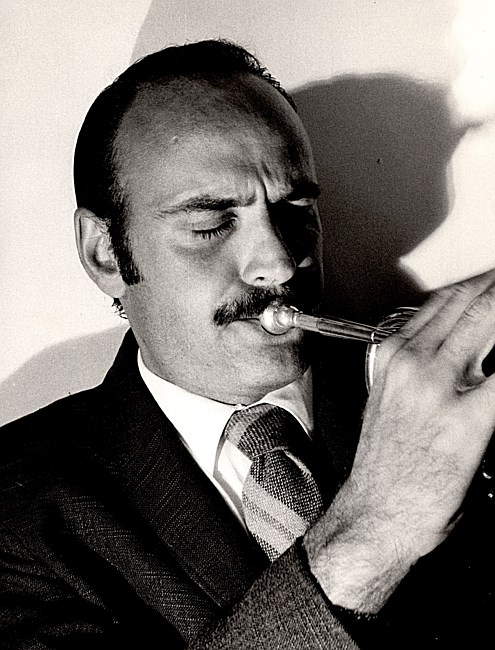
Young Theodore Butterman (Courtesy of Inez Levy.)
In a 2006 conversation at Murphy’s Bleachers, Mr. Butterman told me, “One of my favorites is ‘My Sweet Tooth Says I Want to, But My Wisdom Tooth Says No.’ That was recorded by (swing trumpet player) Roy Eldridge in the 1930s. We have no setlist. We try to keep it upbeat. ‘St. James Infirmary’ doesn’t sell at a ballpark. ‘Twelfth Street Rag’ does. Our job is to make sure fans leave the ballpark with a smile on their face.”
Mr. Butterman was not a novelty act.
He played the Dunes in Las Vegas in the late 1950s. He gigged through the fertile Chicago nightclub scene during the 1960s including sets at the legendary Gate of Horn on North Dearborn Street. In the early 60s, Mr. Butterman played on three albums with late boogie-woogie pianist Little Brother Montgomery. Mr. Butterman called Montgomery his mentor. Through Montgomery, he learned about the totality of music and chord structures. Mr. Butterman was serious about keeping the correct changes on songs.
Mr. Butterman did not know how to read music. Besides coronet, he played banjo, guitar, clarinet, trombone, and piano. Mr. Butterman was an accomplished abstract painter, a gift he kept to himself. He grew up in Hyde Park and South Shore. His father Albert was a physician and his mother Etta was a stay-at-home mom. Mr. Butterman graduated from Hyde Park High School and attended De Paul University.
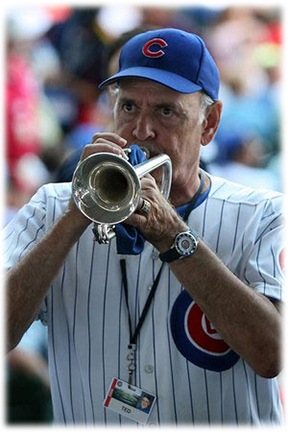
Part of Wrigley Field history.
Between the mid-1980s and 2000 acclaimed Chicago mandolinist Stiernberg (Robbie Fulks, Jethro Burns. Greg Cahill) worked as a sub with Mr. Butterman’s band playing the tenor banjo.
“Ted was a great player, leader and stickler for authenticity,” Steirnberg wrote in a Saturday e-mail. “The music he presented at Wrigley (Trad Jazz, Chicago Style) may have been heard as a tourist attraction, but it was the type of music he loved and knew inside out. He pointed out to me once on a gig that the only other bandleader to have any regular gig at Wrigley Field was KING OLIVER! King Oliver, of course being the great cornetist in the formative early years of jazz who hired Louis Armstrong, launched his career and brought him to Chicago. I think Ted was proud of that connection to the history of jazz. I hope he was.”
Mr. Butterman also recorded with the popular late 1960s Chicago pop-rock band Spanky & Our Gang. In 1967 Mr. Butterman’s Neo Passe’ Jazz Band recorded with the Jim Kweskin Jug Band (Geoff and Maria Muldaur) on the album “Jump For Joy.” During the mid-1960s he enjoyed a residency at the Village Tavern in Long Grove. He played FitzGerald’s nightclub in Berwyn and a funeral for a senior vice president of Standard Oil.
Ted Butterman and his Gold Coast Jazz Band toured the country in 1963 as the opening act for comic Phyllis Diller. He applied lessons learned on that tour for his Wrigley Field gigs. “I learned to smile a lot opening for Phyllis,” he told me. “You had to smile at all times when you were on stage–whether you felt like it or not.”
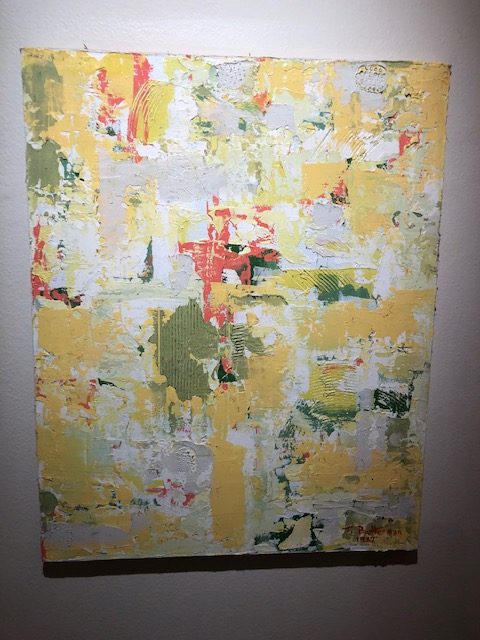
Ted’s artwork. He never told anyone about this. (Courtesy of Inez Levy.)
Towards the end of his Wrigley Field career, Mr. Butterman was the only original member of his group. He took his job seriously. He never missed a game. He played with a 102-degree fever. It is not easy to play jazz at Wrigley Field in the cold and wind of April.
Stiernberg explained, “Weather was one of several challenges on the gig. The routine was to play a set in front of the marquee before game time, then enter the park and walk the circumference of the aisles (mezzanine, bleachers, etc.), playing a tune between each inning. The cue to stop was the catcher throwing the ball to second base. Dodging fan traffic and abuse–’Free Bird!’, beer bath on the banjo, mouth injury for horn players getting rammed, was balanced by warm responses from music fans and posing for pictures.”
But the cold weather seemed to bother Mr. Butterman the most. He once told me, “You can’t get your horn in tune. The banjo player is struggling. He can’t feel his fingers against the metal strings. Your lips don’t freeze to the mouthpiece as lore would have it, but it makes your lips numb so you can’t feel anything.
“But I love being there, no matter what.”
That’s why Mr. Butterman’s gradual departure from the ballpark stung. Although he was healthy, the number of his group’s appearances diminished. He felt he was being pushed away like game programs and paper tickets.
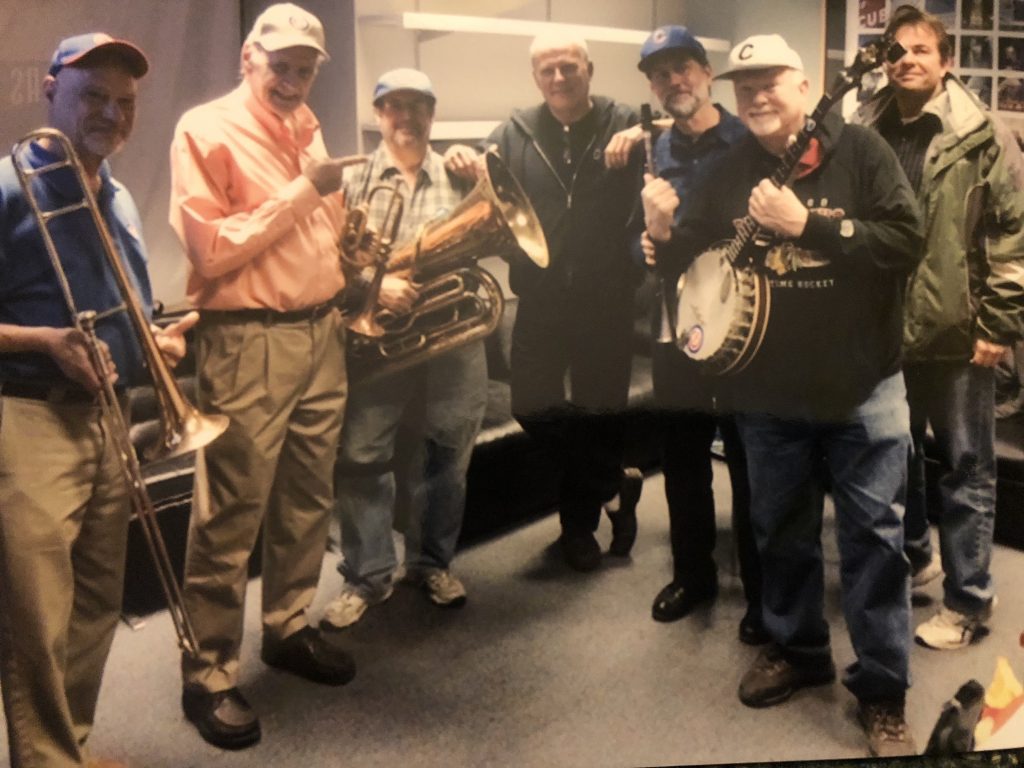
WGN radio jam session. From left: Tom Bartlett, Ted, Rich Armandi, me, Kurt Bjorling, Rob Curtis, and Friend of Show Mike Reischel (Photo by Dan Long)
In 2015, I tried to keep Mr. Butterman in the limelight by inviting him and his band to perform on my WGN-AM radio show. When Gallagher Way (then called the Park at Wrigley) opened in 2017, Mr. Butterman and his band were banished to playing outside the gift shop adjacent to the ballpark. I went to visit him. And then Mr. Butterman vanished like warm notes into a cold night.
Mr. Butterman and his music will always hold a place in my Wrigley Field experience. As major league baseball and Wrigley Field moves more into a corporate world, Mr. Butterman’s act recalls a time when it was fun to be quirky and real.
Mr. Butterman and his accomplished musicians found purity in connecting with people on a live song and a memory. You don’t need bells and whistles. And when Mr. Butterman and his group floated down the aisle to play another tune for another group of fans, he always left them smiling.
Ted Butterman is survived by sister Inez Levy, many nephews and nieces and thousands of baseball fans. Services have been held. Internment was at Waldheim Cemetery in Forest Park.

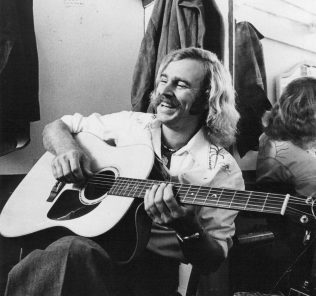
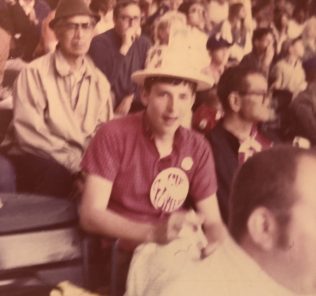
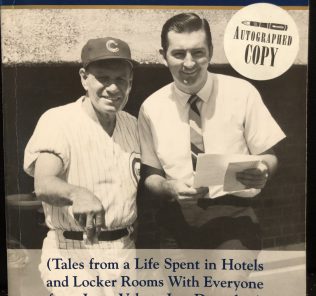
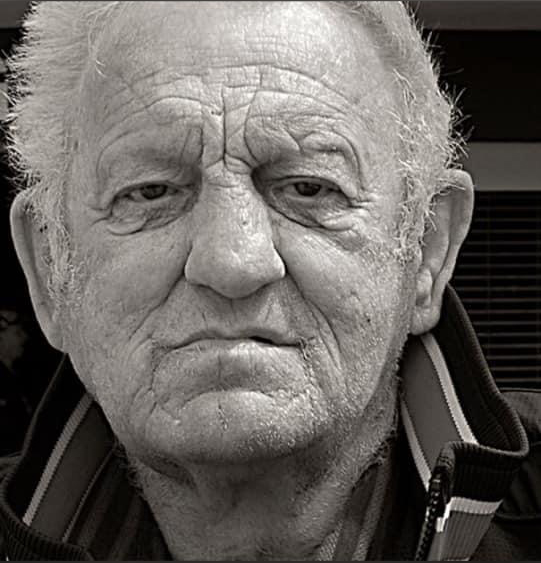


What a beautiful piece about Ted! Harriet Choice would have loved it. Ted was one of the people Harriet spoke with frequently. And, by the way, your entire website is a wonderland for people interested in what makes Chicago Chicago. Brava!
Thanks for checking in and finding this Jeff! Have a happy 2024, Dave